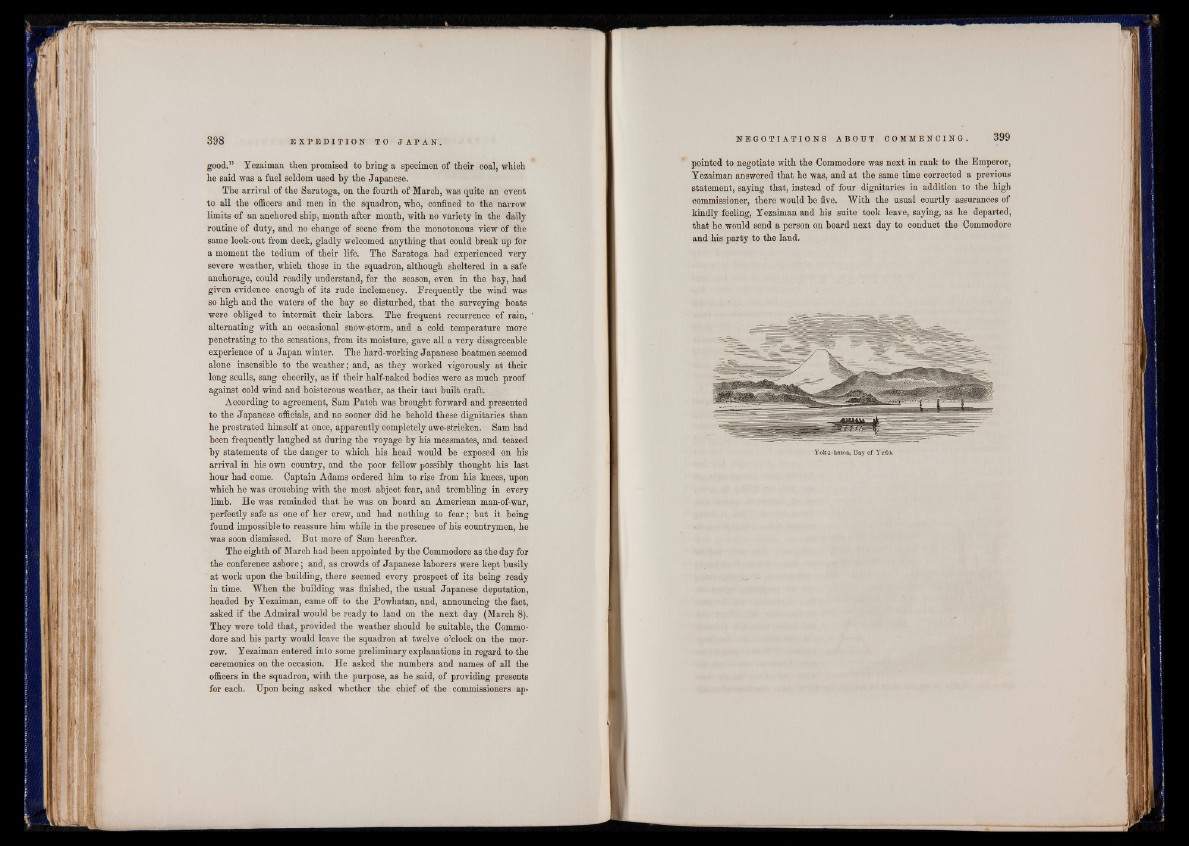
good.” Yezaiman then promised to bring a specimen of their coal, which
he said was a fuel seldom used by the Japanese.
The arrival of the Saratoga, on the fourth of March, was quite an event
to all the officers and men in the squadron, who, confined to the narrow
limits of an anchored ship, month after month, with no variety in the daily
routine of duty, and no change of scene from the monotonous view of the
same look-out from deck, gladly welcomed anything that could break up for
a moment the tedium of their life. The Saratoga had experienced very
severe weather, which those in the squadron, although sheltered in a safe
anchorage, could readily understand, for the season, even in the bay, had
given evidence enough of its rude inclemency. Frequently the wind was
so high and the waters of the bay so disturbed, that the surveying boats
were obliged to intermit their labors. The frequent recurrence of rain,
alternating with an occasional snow-storm, and a cold temperature more
penetrating to the sensations, from its moisture, gave all a very disagreeable
experience of a Japan winter. The hard-working Japanese boatmen seemed
alone insensible to the weather; and, as they worked vigorously at their
long sculls, sang cheerily, as if their half-naked bodies were as mueh proof
against cold wind and boisterous weather, as their taut built craft.
According to agreement, Sam Patch was brought forward and presented
to the Japanese officials, and no sooner did he behold these dignitaries than
he prostrated himself at once, apparently completely awe-stricken. Sam had
been frequently laughed at during the voyage by his messmates, and teazed
by statements of the danger to which his head would be exposed on his
arrival in his own country, and the poor fellow possibly thought his last
hour had come. Captain Adams ordered him to rise from his knees, upon
which he was crouching with the most abject fear, and trembling in every
limb. He was reminded that he was on board an American man-of-war,
perfectly safe as one of her crew, and had nothing to fear; but it being
found impossible to reassure him while in the presence of his countrymen, he
was soon dismissed. But more of Sam hereafter.
The eighth of March had been appointed by the Commodore as the day for
the conference ashore; and, as crowds of Japanese laborers were kept busily
at work upon the building, there seemed every prospect of its being ready
in time. When the building was finished, the usual Japanese deputation,
headed by Yezaiman, came off to the Powhatan, and, announcing the fact,
asked if the Admiral would be ready to land on the next day (March 8).
They were told that, provided the weather should be suitable, the Commodore
and his party would leave the squadron at twelve o’clock on the morrow.
Yezaiman entered into some preliminary explanations in regard to the
ceremonies on the occasion. He asked the numbers and names of all the
officers in the squadron, with the purpose, as he said, of providing presents
for each. Upon being asked whether the chief of the commissioners appointed
to negotiate with the Commodore was next in rank to the Emperor,
Yezaiman answered that he was, and at the same time corrected a previous
statement, saying that, instead of four dignitaries in addition to the high
commissioner, there would be five. With the usual courtly assurances of
kindly feeling, Yezaiman and his suite took leave, saying, as he departed,
that he would send a person on board next day to conduct the Commodore
and his party to the land.
Yoka-hama, Bay of Yedo.